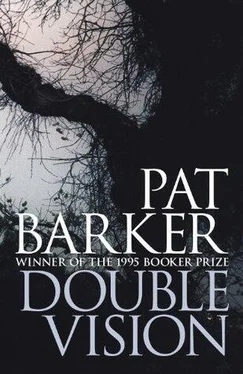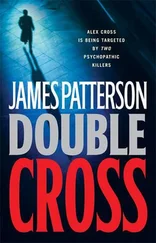‘Yes, Robert said you’d had an accident.’
‘I crashed the car — just down there, on that bend — and it’s left me with neck and back problems. So I just had to bite the bullet and take somebody on.’
‘You don’t like the idea?’
‘Hate it. I like to be able to walk up and down and shout and swear when it doesn’t go right.’
She was smiling, but he guessed she meant it.
‘But he’s all right. It seems to be working.’
She looked strained. If this had been an interview, he’d have been on to it at once, probing what was obviously an area of doubt. But it wasn’t. He was visiting a friend’s widow. And he was beginning to like her a lot. He liked her lack of pretension, the brisk, workmanlike approach.
He didn’t mention the reason he’d come till they were back in the living room and she was serving coffee. Then he said, ‘Have you had time to think about the photographs?’
‘There’s nothing to think about. I know Ben would have wanted you to have them. And that’s good enough for me.’ She handed him a cup of coffee and sat down with her own. ‘He often talked about you.’
‘I miss him.’
A pause. ‘I’ve got some of his Afghanistan stuff over in the studio. The last things he took.’ Her voice stayed steady, but her eyes were bright. He looked away, giving her time to recover herself, but there was something she had to say first. ‘And I want to thank you for sending this back.’ She touched the amulet round her neck. ‘It was you, wasn’t it?’
‘Yes.’
‘You found him?’
‘Yes. It was instantaneous. He couldn’t possibly have suffered anything. I doubt if he knew.’
She nodded. ‘I hoped it was like that. They said it was, but you don’t always get the truth, do you?’
‘No, it was.’
‘I’m glad.’ A deep breath, ‘So what’s the book about?’
‘Ways of representing war. It’s not what they want me to do, they want me to write anecdotes. You know: Amusing Mass Murderers I Have Met.’
‘But this is the one you need to write?’
‘Yeah. I can even tell you what started it. Jules Naudet, the guy who was following a rookie fireman round New York on 9/11 and just found himself filming the attack on the towers? Well, something he said haunted me. At one point he turned his camera off — he wouldn’t film people burning — and he said, “Nobody should have to see this.” And of course immediately I thought of Goya.’
‘“One cannot look at this”?’
‘Yes — but then “I saw it.” “This is the truth.” It’s that argument he’s having with himself, all the time, between the ethical problems of showing the atrocities and yet the need to say, “Look, this is what’s happening”… and I thought, My God, we’re still facing exactly the same problem. There’s always this tension between wanting to show the truth, and yet being sceptical about what the effects of showing it are going to be.’
‘Yeah, I know exactly what you mean. I had this conversation with Ben… oh, hundreds of times.’ The sadness returned. ‘You should be doing this book with Ben, really.’
‘If I use his photographs, I will be. In a sense. And I’ll talk about things that happened, you know, making the ethical decision when you’ve only got a second to make it. You see, the thing Ben and Goya have got in common is that they went on doing it. Whatever the doubts, it didn’t stop them.’
‘Rightly.’
‘Yes, I think so.’
A short silence. He was aware of the flicker of firelight across Ben’s features.
‘Would you like to see where he worked?’
‘I’d love to.’
He finished his coffee and stood up. They walked across the yard, the brief thaw already giving way to night and frost. The ruts were harder now, crusted on top. His feet bit into them, then held. A low building faced them across the yard. Kate got out her keys, fumbled with the lock and stood aside. He thought she was just letting him go first, but no, she stayed outside. Was she being tactful and giving him a few minutes to himself? Or had she not been in since Ben died?
He stepped over the threshold, thinking that perhaps the last person to breathe the air in this room had been Ben. The carpet held flakes of his skin, hairs from his head must lie on the cushions of the sofa over there. The forensic science of grief. We shed ourselves all the time, he thought, shed and renew and shed again until that final shedding of our selves.
Dust everywhere, and a cobweb in the corner of the window. The last rays of the setting sun caught the glass and turned the death trap into a thing of beauty.
‘The light switch is on your right.’
He flicked on the switch, hating the glare of light that dissipated the shadowy presence he’d sensed in the room. But he pulled himself together and went across to the table. Computer, scanner, a printer — far more advanced than anything he ever needed to use — but along the wall facing the desk there were box files neatly labelled: date and place. The archive of a working life.
What was missing was the one box he hadn’t come back to label: Afghanistan, 2002.
He heard a man’s voice behind him speaking to Kate. Then she called from the door: ‘I’m just going across to the studio. I won’t be a minute.’
He pulled out the file on Bosnia and looked through some of the prints, recognizing places and people. A chandelier in a devastated ballroom; an old Serbian woman surrounded by icons, scraps of food on the table in front of her; a queue of women and children waiting their turn at the tap; an old Muslim woman, tottering down the street with a milk bottle full of water, the only container she was strong enough to carry; and then, without warning, there she was: the girl in the stairwell.
He gaped at the print, unable to understand why it was there. Obviously Ben had gone back the next morning, early, before the police arrived, to get this photograph. He’d restored her skirt to its original position, up round her waist. It was shocking. Stephen was shocked on her behalf to see her exposed like this, though, ethically, Ben had done nothing wrong. He hadn’t staged the photograph. He’d simply restored the corpse to its original state. And yet it was difficult not to feel that the girl, spreadeagled like that, had been violated twice.
Quickly, he replaced the photographs and went out into the yard.
The long shadows cast by the house and trees were creating an advance guard of deep frost. Chickens, stepping out cautiously on their cracked yellow feet, were pecking about on the frozen ground, where wisps of straw shone like gold. The cock looked up at him with a bright amber eye.
Kate came across the yard, smiling. ‘Would you like to see the ones I had framed? Have you got time?’
Her studio was a taller building on the third side of the farmyard. A narrow door led into a small lobby used to store raw materials: bags of plaster, bales of hessian, yellowing piles of old newspapers. Through another door into a vast barn, one wall made entirely of glass. Outside darkness was falling — only the crests of the hills still caught a glint of light.
The studio was heated by a wood-burning stove whose flames flickered all over the dim interior. Kate switched on the lights. In the centre, partly obscured by scaffolding, was a huge, crudely carved male figure.
‘That’s it,’ Kate said sighing, hands pressed hard into the small of her back, like a peasant woman who’s been doing hard physical work all day. He’d noticed her hands over lunch. They were certainly not glamorous. Thick veins, rough skin, splitting nails — you’d expect to see hands like hers on a building site.
Clustered in the corner was a group of white plaster figures, striding out. Extraordinary figures: frightened and frightening.
Читать дальше












